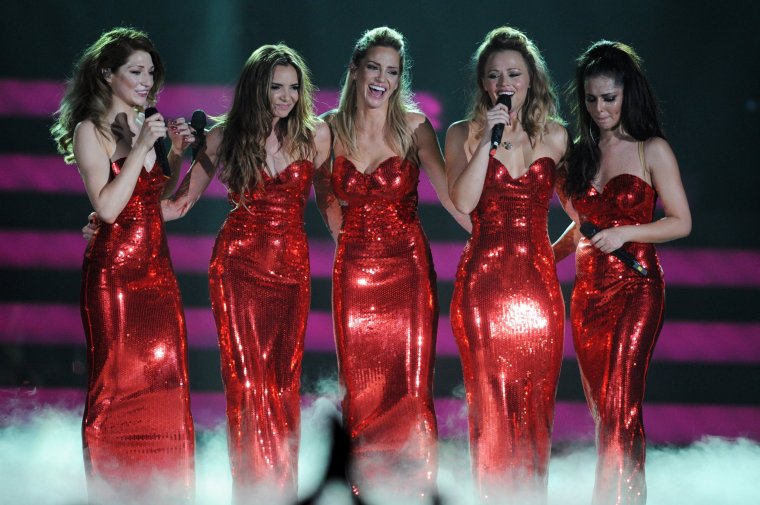It took seven years and 19 top 10 singles for Girls Aloud to win their first Brit Award. “It’s about time!” shouted a boisterous Sarah Harding into the mic when they collected the Best Song trophy for “The Promise” in February 2009. It would take another 12 years still for an all-female band to win Best Group – Little Mix took the award in 2021, a year before they split up, with a nod to the oversight in the acceptance speech. “The fact that a girl band has never won this award really does speak volumes, so this award isn’t just for us, it’s for the Spice Girls, Sugababes, All Saints, Girls Aloud, all of the incredible female bands. This one’s for you!”
All of this is to say that girlbands, and Girls Aloud in particular, are frequently overlooked as “serious” acts, even within the commercial realm of pop music. Now, the band are reuniting for a UK and Ireland tour in May and June 2024 – a show that aims to celebrate their career, and commemorate Harding following her tragic death to breast cancer in 2021, aged just 39. Times have certainly changed, and on the surface, the girlband seems to be having a revival: the Sugababes also reunited in their original form, to huge success, in 2020, and are still going strong; there has been industry buzz around newcomers FLO. So what will a resurgence do for Girls Aloud’s reputation?
Though Girls Aloud were extremely popular – with 13 consecutive singles in the top 10 – they also felt a little controversial even in their heyday. Despite their “artificial” beginnings – Harding, along with Cheryl Cole, Kimberley Walsh, Nicola Roberts and Nadine Coyle were voted into the band by the British public on Pop Stars: The Rivals in 2002 – their songs weren’t straightforward bubblegum pop.
Helmed almost exclusively by Brian Higgins and the team at Xenomania, who also wrote for the Sugababes, their music was experimental and boundary pushing, with mid-song groove changes (“Sexy (No No No)” and “Biology” are two notable examples) and genre mash-ups (“Love Machine” had an indie-pop feel that was only exacerbated when it was covered by Arctic Monkeys in the Radio 1 Live Lounge in 2011). This lent them a bit of edge – and befitted their collective, outspoken personality. (A video showing them slagging off the Pussycat Dolls in an MTV interview in 2006 is now a viral social media favourite.)

Their unpredictable musical direction combined with their sexualised, hyper-feminine image meant that Girls Aloud’s reputation has always been slightly mixed; this is in contrast with their most obvious comparison, the Sugababes, who despite changes of line-up have always had a cohesive brand. The band were always unapologetic about the fact that they didn’t write their own songs. In an interview with The Independent in 2006, Cole emphasised that Higgins, their primary songwriter, wouldn’t be able to do his job without them – a true, but uncommon and subversive, observation.
But this brazenness never quite translated to a sense they were on the cutting edge. Instead, Girls Aloud were associated with the kind of trashy pop culture and style that music-heads eschewed in the 2000s in favour of more “authentic” indie. They were synonymous with shorts and tights, peplum tops, foundation lips and clattering heels; they couldn’t play any instruments, and were managed by Louis Walsh.
This image also goes a long way in contributing now to a contemporary, intense fandom fuelled by nostalgia. In their high-camp, sincere, performative femininity, Girls Aloud have become icons for the queer community and straight women alike. This does raise hopes for the impact of the tour, which the band have been adamant isn’t a “comeback”. They have elected not to make any new music “because Sarah wouldn’t be included in that newness”, as Cole told Vogue in an interview with the band this week. “This is about celebrating the 20 years we’ve all had.” Instead, they will simply play the greatest hits, presumably with a lot of Soap-and-Glory-scented glamour and a bombastic show.
Perhaps this is the way to do a reunion – a no-frills tribute to the good times untainted by the likes of a new single trying to compete with hot young things. But on the other hand, Girls Aloud – who, in “Love Machine”, called themselves “gift-wrapped kitty cats” – have made no attempt to change their spots, which means that when it comes to being taken seriously, they might still be left waiting.

